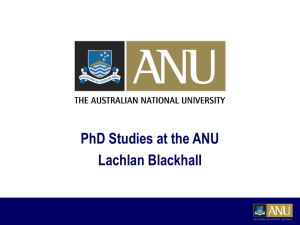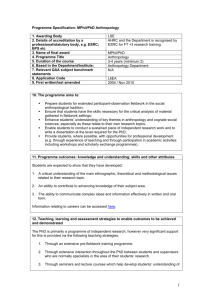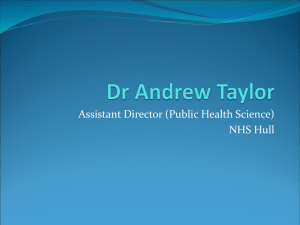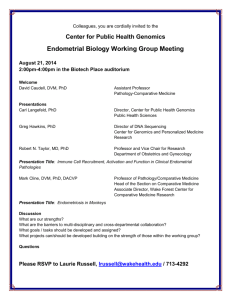PROGRAMME SPECIFICATION: MRes/PhD Anthropology
advertisement
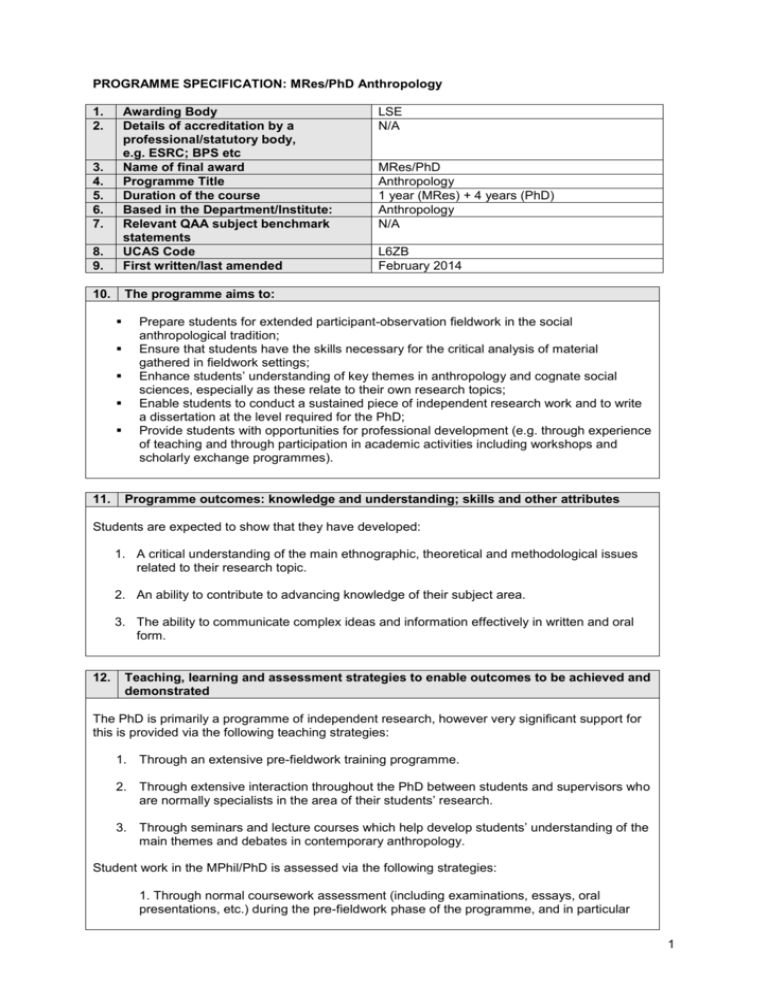
PROGRAMME SPECIFICATION: MRes/PhD Anthropology 1. 2. 8. 9. Awarding Body Details of accreditation by a professional/statutory body, e.g. ESRC; BPS etc Name of final award Programme Title Duration of the course Based in the Department/Institute: Relevant QAA subject benchmark statements UCAS Code First written/last amended 10. The programme aims to: 3. 4. 5. 6. 7. 11. LSE N/A MRes/PhD Anthropology 1 year (MRes) + 4 years (PhD) Anthropology N/A L6ZB February 2014 Prepare students for extended participant-observation fieldwork in the social anthropological tradition; Ensure that students have the skills necessary for the critical analysis of material gathered in fieldwork settings; Enhance students’ understanding of key themes in anthropology and cognate social sciences, especially as these relate to their own research topics; Enable students to conduct a sustained piece of independent research work and to write a dissertation at the level required for the PhD; Provide students with opportunities for professional development (e.g. through experience of teaching and through participation in academic activities including workshops and scholarly exchange programmes). Programme outcomes: knowledge and understanding; skills and other attributes Students are expected to show that they have developed: 1. A critical understanding of the main ethnographic, theoretical and methodological issues related to their research topic. 2. An ability to contribute to advancing knowledge of their subject area. 3. The ability to communicate complex ideas and information effectively in written and oral form. 12. Teaching, learning and assessment strategies to enable outcomes to be achieved and demonstrated The PhD is primarily a programme of independent research, however very significant support for this is provided via the following teaching strategies: 1. Through an extensive pre-fieldwork training programme. 2. Through extensive interaction throughout the PhD between students and supervisors who are normally specialists in the area of their students’ research. 3. Through seminars and lecture courses which help develop students’ understanding of the main themes and debates in contemporary anthropology. Student work in the MPhil/PhD is assessed via the following strategies: 1. Through normal coursework assessment (including examinations, essays, oral presentations, etc.) during the pre-fieldwork phase of the programme, and in particular 1 through examination of the research proposal, including a viva, at the end of the prefieldwork year. 2. Through the formal review and viva which is held three terms after students return from fieldwork. 3. At the end of the PhD through the formal examination and viva for the PhD dissertation. 13. Programme structures and requirements, levels, modules and awards MRes/PhD Anthropology Additional information 14. Criteria for admission to the programme To be admitted to the MRes/PhD programme, students must meet the normal School requirements for PhD admissions and must specifically hold a university-level degree in social anthropology from a UK university. In some cases, subject to the approval of the School, we are able to admit students who hold a BA/BSc in social anthropology from a UK university but no further qualification. 15. Indicators of quality 16. The success of PhD Anthropology students in obtaining prestigious posts and fellowships at universities in the UK and overseas; High quality of departmental research: the highest percentage of the maximum 4* rated submissions across the UK in the 2008 RAE and success in obtaining competitive research grants (e.g. from ESRC); Authorship of key texts: members of the department – who supervise our PhD students – have published important texts in the areas which we teach and on which our students conduct research. The School participates in the Postgraduate Research Experience Survey (PRES) which provides indicators of student satisfaction with various aspects of their research degree programme. Results from this survey have been positive for the School; Examiners’ reports from viva examinations are considered centrally within the School and provide indicators on the quality of the research student experience and supervision quality; The LSE Careers Centre website provides data on career destinations of LSE research graduates: click here; Methods for evaluating and improving the quality and standard of teaching and learning Ongoing changes to programme in response to feedback and new initiatives. Participation in activities of LSE’s Teaching and Learning Centre. Mentoring/review/promotion process includes an assessment of teaching. The Teaching and Learning Centre (TLC) runs the Postgraduate Research Experience Survey (PRES) and distributes results to departments. Survey results are considered by the Department as well as by School Committees (the RDSC & the ASC). Taught courses on the existing MPhil/PhD and proposed MRes/PhD programmes are included in the School’s internal TQARO student satisfaction survey, where such courses are provided at the Masters’ level. The Department’s Teaching Sub-Committee periodically reviews all of its programmes. The Methodology Institute offers methodological training across all MPhil/PhD and MRes/PhD programmes and transferrable study skills training courses are offered by the TLC for all MPhil/PhD and MRes/PhD students: this central resource enhances the standard of teaching and learning for all research students across the School. 2 School level quality assurance processes include: 1. a system of initial programme approval, with input from the providers of resource-based services (including the Library, IT Services and the Academic Planning and Resources Committee) and including an external assessor's report, to be conducted by the School's central academic bodies; 2. a system of initial course approval, with input from the providers of resource-based services and conducted by the School's central academic bodies; 3. a system of approval of major modifications to programmes and courses, conducted by the School's central academic bodies; 4. a system of central review of departmental taught provision every five years or so, informed by available evidence, including student views, the main purposes being to promote development, identify and disseminate good practice, and to flag any concerns over standards to departments, without adjudicating on them; 5. a system of gaining student feedback on their teaching and learning experience in the School; 6. periodic review by the School's academic bodies of its internal Codes of Practice; 7. due and appropriate consideration of national quality assurance requirements through the School's committee structure; and 8. departments have the following arrangements in place for assuring their quality and standards: 8.1. Staff-Student Liaison Committees for all students that meet regularly, with minutes of meetings produced and circulated to staff and students; 8.2. Departmental Staff meetings that involve all staff, meet at least three times per academic year, and consider information from any other extant departmental committees. Minutes should be produced and circulated to staff; 8.3. A Teaching Committee that involves appropriate departmental staff, meets regularly each academic session and considers all aspects of departmental learning and teaching, including new programme and course proposals. Minutes should be produced and circulated to members; 8.4. A system for ensuring the effective participation in the School's annual programme monitoring exercise; 8.5. A system for considering course and programme results annually, and revising taught provision as appropriate; 8.6. A system for considering student survey course results annually, and revising taught provision as appropriate; 8.7. A system for considering external examiners’ reports, and acting on them, on an annual basis, with the School having an associated responsibility (a) to ensure that the system functions and (b) for any School-wide lessons on both good practice and areas of concern from the reports collectively. 3




